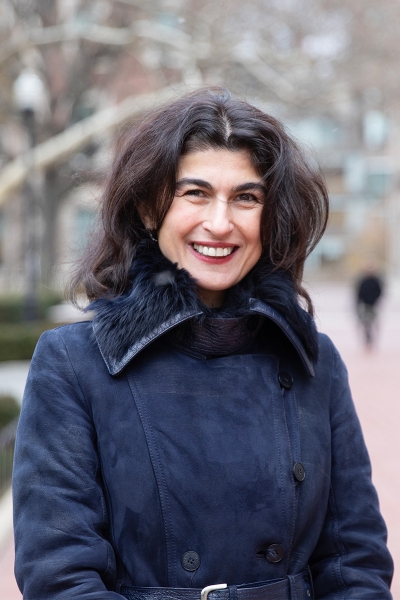
Emma Asher
In this series, we speak with professors who lead different sections of the Core Curriculum to learn what they love about engaging with College students. This month we chat about Frontiers of Science with Klejda Bega, a lecturer in the discipline of physics. Bega specializes in conducting research in atomic, molecular and optical physics, focusing on precise manipulation of ultracold atoms and molecules in optical lattices. She has been teaching Frontiers for 12 years.
What is the best part about teaching the Core Curriculum?
There are two best parts, I would say. The first is that by teaching in the Core, you get to see a cross-section of students. I meet students from all over the world and get to know them; it’s such a privilege. They’re delightful young people, learning about their life and also learning about what it is they want to do in the future. And then to think, “Oh, maybe I will have some impact on what it is that they want to do” is just such a great feeling. So I love that.
The second is my brilliant colleagues, who come from all disciplines of science. Our faculty meetings are fascinating —any scientific question that you can think of just ask this group and someone would either know the answer or know where to find the answer. I learn something new every week, and I don’t think you can beat that.
What are you teaching that feels especially relevant for this year?
I think that in the world that we live in, it is very important for people to be scientifically literate; for people to be able to think for themselves when they’re given a piece of information. To ask, “How do I evaluate this information? How do I know where to go and find the data that will tell me this is how it really works?” And it’s even more important now that we have information coming from all sides, whether it’s created by humans or by artificial intelligence. The world is becoming more complex and, as such, we have to teach students to think in an even more complex way — to take in interconnected issues as a whole, but also to know how to break them down.
We do not presume that a student will learn all science in one semester of Frontiers of Science; this is not our goal. But by giving them a sampling of how scientists from all disciplines think and how they approach the world and what tools they use in order to understand it? I think that is very valuable. The goal of Frontiers of Science is to teach students how to become good consumers of science, and how to become good critical thinkers using the scientific method. So the idea is that we’ll give all these scientific building blocks we have at our disposal, which then they will apply to their own lives.
What has been your favorite Core Curriculum teaching moment?
I am involved in Math for America, which runs workshops for high school teachers. The idea is to introduce teachers to less traditional methods of teaching and present them with new material. I recently ran a physics workshop and one of the participants told me that I had been the Frontiers of Science instructor for both of his sons at Columbia. He said that when he saw my name on the list, his sons told him, “Oh, you have to take Dr. Bega’s course!” It was so wonderful to see that I’ve managed to reach two generations; that was very, very rewarding; it reminded me again that that’s what one does all this for.